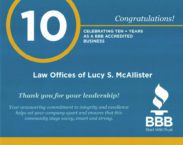Maintaining appropriate professional boundaries is essential for California bankers and financial advisers who wish to avoid risking their professional licenses. While advising and helping clients accumulate wealth are important components of banking, a financial adviser must adhere to appropriate standards of conduct with clients at all times. It is imperative that bankers and financial advisers maintain professional boundaries to protect themselves, both legally and professionally.
Consider the following theoretical vignette:
Ella, a financial planner, receives a call from a potential client, Susan, whose husband recently filed for divorce unexpectedly. Even though Susan does not meet Ella’s minimum asset requirements, Ella accepts Susan as a client after Susan mentions that Mike Mogul, a high-profile business mogul, recommended her. Ella meets Susan, during which Susan is clearly devastated and scared for her financial future. Ella reviews Susan’s financial documents and begins to create a realistic budget for her, educates her on the tax implications of her divorce, and outlines a long-term financial strategy for Susan. Susan has not worked for years and breaks down, sobbing “What am I going to do? Will I be ok?” Ella hugs Susan and assures her that she will be okay financially. Ella promises that her proposed investment strategy will keep Susan very comfortable. At the end of the meeting, Susan thanks Ella profusely and says “I will be telling Mogul what a lifesaver you are. Did you know he’s looking for a new financial adviser?” What professional boundaries have been violated? How should Ella proceed?
The above example underlines the complexities of maintaining proper boundaries as a banker or financial adviser.
Get Expert Legal Help Now!
What is a professional boundary?
Professional boundaries define appropriate behavior between professionals and the public. Power imbalances often exist within a professional relationship, and boundaries serve to protect both the public and professional. The banking/client relationship is inherently unequal. A banker or financial adviser holds a unique position of authority. Advising and helping clients accumulate wealth are important components of banking, and the financial adviser/client relationship must be developed without crossing professional and/or legal boundaries.
What is a boundary violation?
A boundary violation involves any behavior or interaction which causes harm to the professional or public. The adviser/client relationship involves trust, respect, and guidance. If this relationship is exploited, a boundary violation has occurred.
What are potential boundary violations between bankers/financial advisors and clients?
- Social Media use violations: Choosing an inappropriate financial product or service for a client, initiation communication with clients on social media, posting inappropriate or sexually explicit content on one’s personal social media.
- Emotional violations: Mismanaging feelings of anger or frustration toward a client, treating a client as a peer, parent, child, or friend.
- Physical violations: Inappropriate physical contact between professional and client.
- Relationship violations: Engaging in a romantic or sexual relationship with a current client, flirting with a client.
- Power violations: Telling a client what will happen next in the economy, using a client’s fear against them when pitching investment strategies, using a client’s personal connections for personal gain.
- Financial violations: Planners loaning money to a client or asking a client for money.
- Communication violations: Failing to communicate clearly about fees with clients, failing to communicate regularly with a client about their financial needs, failing to adjust an investment strategy as needed for a client’s current needs, asking a client overly personal questions, failing to refer a client as necessary.
While many of the above examples are clear boundary violations, others may begin with a financial planner’s best intentions. Consider a financial advisor who aggressively urges an elderly man to diversify his holdings for his own long-term financial benefit, a banker who does not want to overwhelm his recently widowed client with the lengthy explanation of his fees, or a financial planner who hugs a crying client. Financial advisors and bankers must learn to recognize and develop a plan to minimize potential boundary breaches so they can protect and defend their professional licenses.
How does a banker or financial advisor maintain appropriate professional boundaries?
All behaviors and interactions between a banker/advisor and client should prioritize the well-being of clients. Banker and financial advisors have a unique position of authority, trust, and influence. Their focus should be on meeting the needs of the client at all times, and they must be vigilant in considering the implications or consequences of their behavior.
Examples of bankers and financial advisors at risk for boundary violations:
- New bankers/advisors: Potential boundary violations may be more difficult to recognize for those newer to the profession. Newer bankers and financial advisors should regularly consult with their supervisor to minimize the risk of boundary violations.
- Similarly-aged professionals/clients: Bankers and financial advisors of similar age to clients may discover common interests or hobbies. Regardless of age, financial advisors and bankers must be mindful of the potential for boundary violations.
- Practitioners in small towns or rural settings: Bankers and financial advisors who work in a small town may see their clients frequently outside of the office. They should devise a plan as to how such encounters should be handled in order to minimize potential boundary issues.
- Planners with dual relationships: Some bankers and financial advisors may hold dual relationships with clients. A banker may also be the coach of a client’s son. Dual relationships can be messy, and vigilance is required to avoid a slippery slope of boundary violations.
- Professional’s at risk socially/emotionally: Bankers and financial advisors who are undergoing difficult personal circumstances such as grief, loss, divorce, or mental health issues can be at greater risk for blurred boundaries.
Questions bankers and financial advisors should ask themselves:
- Do I treat any particular client differently than others?
- What is my social media policy related to my clients?
- Do I have any inappropriate content on my personal social media accounts?
- Would I behave differently with my client if I was in the presence of my supervisor?
- Do I dress or act differently when I know that I will see a particular client?
- Has a colleague ever questioned my behavior toward a client?
- Would I have concern about another professional behaving as I do?
- Do I ever put my own well-being above that of my clients?
- Am I currently having any personal difficulties that could affect my professional judgement?
- Do I regularly consult with my supervisor about potential boundary risks?
- Am I following the standards of conduct expected within my profession?
If you are a banker or financial advisor facing disciplinary action, it is imperative to enlist the assistance of an experienced licensing attorney at the earliest stage of the disciplinary process. The Law Offices of Lucy S. McAllister are here to help. We understand the unique legal complexities facing bankers and financial advisors. We have the knowledge and experience to craft a comprehensive strategy and are dedicated to navigating your specific case through the disciplinary process to best defend your professional interests.
Lucy S. McAllister has successfully represented a wide range of California licensed professionals including financial professionals, educators, nurses, physicians, and mental health practitioners. We are experienced in handling all types of licensing issues. Let us help you protect your professional license, your reputation, and your livelihood.
For additional information or to schedule a consultation on a professional licensing issue, please contact us today at (877) 280-9944.












